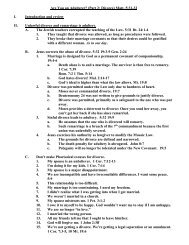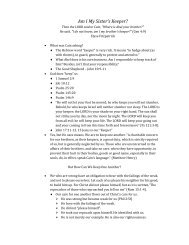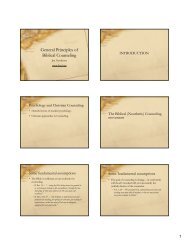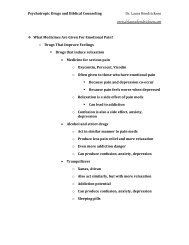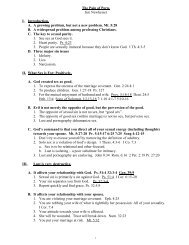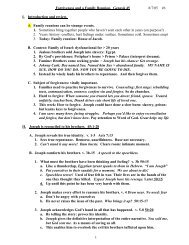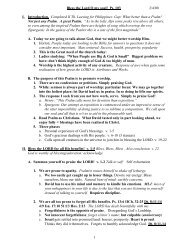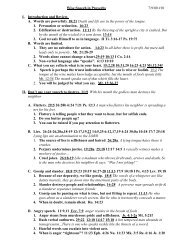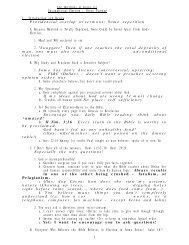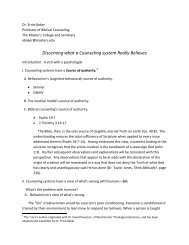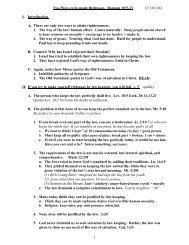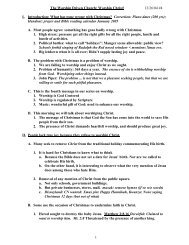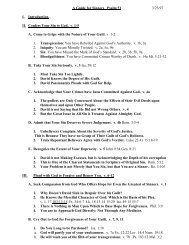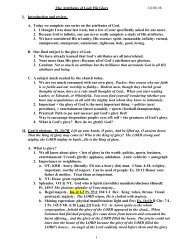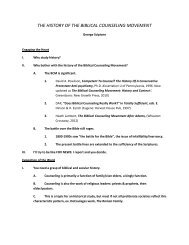1 Samuel 24.pdf - Biblicalcounselingonline.org
1 Samuel 24.pdf - Biblicalcounselingonline.org
1 Samuel 24.pdf - Biblicalcounselingonline.org
You also want an ePaper? Increase the reach of your titles
YUMPU automatically turns print PDFs into web optimized ePapers that Google loves.
I. Introduction.<br />
David Refuses to take take Revenge on Saul. I <strong>Samuel</strong> 24 12/7/08 #28<br />
A. There is a saying, ‘revenge is sweet’ (not in the Bible).<br />
1. Whole webpage: revenge Movies (not that I’ve seen all): Westerns: Unf<strong>org</strong>iven; 9<br />
to 5: sexist boss; movie advertised: woman gets even w/all her old boyfriends.<br />
2. Real life: San Jose a few weeks ago: fired employee shot & killed boss/supervisor,<br />
When in Saudi (80s): Computer specialist fired: big company: left electronic<br />
timebomb > when on way back to UK: wiped out data, called for backups.<br />
3. Most of us: been hurt: face temptation to take vengeance. Big & small.<br />
B. No more dramatic opportunity for revenge than I <strong>Samuel</strong> 24: after Saul has been<br />
chasing David, trying to murder: David gets a golden opportunity: take out Saul.<br />
1. Context: right after narrow escape: Ziph: Saul seemed to have David cornered<br />
> called away: fight Philistines.<br />
2. Saul resumes chase: falls into David’s hands.<br />
3. Actually first of 3 chapters in which David has to resist the temptation to take his<br />
own revenge (twice Saul, once Nabal): Leave room for God’s wrath.<br />
C. Bigger picture.<br />
1. Temptation to take out Saul: temptation to end life of exile/suffering and gain his<br />
crown - prematurely. Greatness of David: devoted to the LORD, honors the<br />
anointed: refuses to seize the throne by violence.<br />
2. Same temptation faced: Jesus, Son of David: tempted by Satan: Crown w/o cross.<br />
Necessary: obedience and suffering before glory:<br />
3. Also sets an example for us: respect authority, not take revenge, wait on the Lord.<br />
II. David spares Saul’s life in the cave near Engedi. 24:1-7 Very similar Chpt. 26<br />
A. Saul again pursues David. v. 1-2<br />
1. No word about how fight with Philistines went. Not Saul’s main concern.<br />
2. Again: intelligence network: WWW reveals David’s whereabouts.<br />
3. Saul brings 3000 chosen men. Outnumbers David 5 to 1;<br />
a. Chosen: Best of the best: Rangers, Seals, Marines.<br />
B. David has his golden opportunity to kill Saul. v. 3-5<br />
1. Saul is an extremely vulnerable position. v. 3 Judg. 3:24 I Ki. 18:27<br />
another passage probably not appropriate for a vegitales episode.<br />
a. Funny: Caught w/pants down (no throne back then) Rare:Bible: Eglon<br />
Elijah: Prophets: Baal: perhaps occupied bathroom I Ki. 18:27<br />
b. Only time: Saul completely alone: unguarded: euphemism: had to go to the<br />
restroom > goes into a cave: Privacy. Sets aside armor/spear.<br />
c. Out of the 100s/1000s of caves: picked the very cave where David and his men<br />
are hiding. > God’s sovereign providence: bodily functions, choice bathrooms.<br />
d. Saul comes in out of the bright desert sun: huge cavern > can’t see: David &<br />
men: eyes adjusted to dim light: Can’t believe their eyes.<br />
2. David’s men are sure the LORD has given him this chance to kill Saul. v. 4a<br />
a. Someone speaks up: whispers what everyone else is thinking.<br />
1
. Couch their advice in theological language. 23:7 (as Saul)<br />
c. Refer to some prophecy: about which we don’t know. Priest? Gad?<br />
d. They are right the LORD has delivered Saul into David’s hand: but that<br />
doesn’t mean the LORD wants David to take advantage.<br />
3. Why does David cut off the edge of Saul’s robe? v. 4b 15:27f 18:4 I Ki. 11:30ff<br />
a. Tricky maneuver: Saul right there: need a sharp sword & a sure hand.<br />
b. Obvious reason: Token/proof he could have killed Saul > show him later.<br />
c. Robe: Symbolizes royal authority: 15:27f Tears <strong>Samuel</strong>’s robe > kingdom will<br />
be torn: him; Jon gives: D; Solomon: kingdom torn: next generation: cloak.<br />
d. Symbolically laying claim: Kingdom: You aren’t in control of your own<br />
destiny. Your crown is abut to be taken away from you.<br />
e. Hebrew word: Cut: v. 21 used cut off family; cut a covenant.<br />
4. David is conscience stricken over what he did. v. 5b II Sam. 24:10<br />
a. An assault upon the garments > assault upon his royal person: disrespect.<br />
b. Inappropriate grasping: kingdom: shortcut.<br />
c. Contrast Saul’s hardened conscience. Would have cut much more than D’s robe<br />
C. David will not let harm come to Saul. v. 6-7<br />
1. He refuses to stretch out his hand against the LORD’s anointed. v. 6 10:6,10<br />
16:13 26:11 Ex. 22:28 Anointed key word: Chpt. 24,26 7x<br />
a. The LORD had consecrated him: set apart to be king:<br />
b. It is the LORD’s job to remove him.<br />
2. David forcefully restrains his men from rising up against Saul. v. 7a<br />
a. Imagine how men feel: this affect them: hiding in caves, being chased.<br />
b. If Saul every catches David, they too will die (Nob).<br />
c. Kill Saul > their lives will be greatly improved: promoted: David’s nobles.<br />
d. You know what Saul would do to you/us if he had the chance...<br />
e. Language: NAS David persuaded > literally tore apart.<br />
f. Heated exchange: hushed whispers in cave w/Saul few feet away.<br />
3. David lets Saul escape unharmed. v. 7b<br />
III. David proclaims his innocence to Saul. v. 8-15 long speech. 16:18 good at it.<br />
A. David shows respect to Saul. v. 8,11 26:17f Pr. 24:21 still professes to be a loyal<br />
servant in spite of everything! Calls father (father in law)<br />
B. David makes his defense. v. 9-11,13-14 Pr. 25:15,21-22<br />
1. Don’t listen to evil advisors who falsely accuse me of treason. v. 9 26:19 Pr. 29:12<br />
diplomatic? If a ruler pays attention to falsehood all his ministers become wicked.<br />
2. I had mercy upon you when I could have easily killed you. v. 10<br />
a. Good thing for you that I don’t listen to bad advice!<br />
b. Literally: My eye looked upon you w/compassion.<br />
3. I have physical proof of my innocence. v. 11a Torn robe<br />
4. I have restrained myself in spite of all the evil you have done against me. v. 11b<br />
Spears thrown, Months of chase.<br />
2
5. My actions prove that there is no wickedness in me. v. 13 Mark 7:20-23 Is.<br />
32:6ff<br />
a. Old proverb: What one does reflects what one is.<br />
b. Jesus: out of the heart comes all kinds of sin.<br />
c. Implicit conclusion: why, o Saul, is wickedness coming out of you?<br />
6. Why waste your time chasing someone who is no threat to you? v. 14 26:20<br />
II Sam. 9:9 16:9 II Ki. 8:13<br />
a. Humility: What glory is there is catching a flea?<br />
b. Dead dogs don’t bite.<br />
C. David asks LORD to judge between him and Saul. v. 12,15 Pr. 14:26 In the fear of<br />
the LORD there is strong confidence and his children will have refuge.<br />
1. David refuses to take revenge, but trusts the LORD to deal with Saul. v. 12 14:24<br />
25:31 Lev. 19:18 Dt. 32:43 Is. 1:24 You shall not take revenge, nor bear any grudge<br />
against the sons of yoru people, but you shall love your neighbor as yourself... He<br />
will avenge the blood of His servants & will render vengeance on His adversaries.<br />
a. I will not judge you. v. 12b<br />
b. May the LORD judge between us and take vengeance on you. v. 12a<br />
c. Contrast Saul: Often speaks of being personally avenged.<br />
2. David will continue to trust the LORD to plead his case and protect him. v. 15<br />
25:39 Pr. 22:23 The LORD will be my advocate/lawyer. He will deliver me.<br />
3. David trusts that he will receive the promised crown without taking shortcuts.<br />
IV. Saul acknowledges David’s righteousness. v. 16-22<br />
A. Saul is deeply moved by David’s mercy. v. 16-19a Ps. 37:6 David’s heaping of<br />
burning coals on his head: brought conviction: moment of temporary sanity.<br />
1. He calls David his son. v. 16 Uses name ‘David’ instead of ‘son of Jesse’ Son in<br />
law? Gave daughter to another man!<br />
2. Saul admits David’s righteousness and his own wickedness. v. 17-19 Gen. 38:26<br />
a. More righteous? What? Saul, you are not righteous at all.<br />
b. You did good to me and I have done evil to you. Ps. 3:30 w/o cause.<br />
B. Saul acknowledges that David will be king. v. 19b-20 23:17 13:14 15:28<br />
1. Admits what he has known for a long time. He can’t win. All along: fears David.<br />
2. You are the better man. I know God’s promise will be fulfilled in you.<br />
3. May God reward you. Ruth 2:12<br />
4. Saul has become an Ichobad figure: the glory has departed. 4:19ff 16:14<br />
C. Saul pleads with David to swear that he will not wipe out his descendants when he<br />
rules. 20:14-17 31:2 II Sam. 21:7-9 9:7ff I Ki. 25:28ff 16:11 II Ki. 10:11ff<br />
1. Same plea Jonathan had made.<br />
2. Common practice: new king wipe out enemies: As Saul had priests: Nob.<br />
3. Self focused: No promise in return:<br />
4. David keeps: Punishes those who assassinate Isbosheth; blesses Mephibosheth.<br />
D. Saul’s remorse does not last. 26:1ff<br />
3
1. This is not the only time Saul appears to have a conscience. 15:24,30 19:1ff<br />
a. Ro. 1:32 Everyone has a conscience: some harden.<br />
b. Saul’s reasonable rational moments are neither regular nor extended.<br />
c. Soon he will resume the chase: Same scene repeated 26.<br />
2. Evil men can have remorse over their sin without actually repenting. Ex. 9:27<br />
Mt. 27:3-4 Heb. 12:16-17 M. Henry: Conviction but not conversion.<br />
a. Pharaoh admits I have sinned > Later hardens his heart.<br />
b. Judas: I have sinned against innocent blood.<br />
c. Esau: regrets having given away his birthright:<br />
3. There are many tragic Saul-like characters in our day. 26:21 shallow spirituality<br />
a. Never could a man be more sweetly & winsomely evangelized than Saul was that<br />
day by David.<br />
b. Prison: many feel guilty: Plan to turn over a new leaf: religious experience.<br />
c. Drunkard/abuser: pattern after episode: remorse: often tears: but goes back.<br />
Listen carefully: often upset < consequences, or want to think better of self; or<br />
proud: I will change myself. little of God. No sense of dependence.<br />
d. Person goes to religious meeting: gets emotional. Perhaps comes forward.<br />
4. What is the difference between worldly sorrow and true repentance. II Co. 7:10ff<br />
a. Saying you are sorry, expressing remorse doesn’t make you repentant.<br />
b. True repentance produces a transformation of life and character.<br />
5. Don’t be like Saul! Jesus offers you a way of escape from sin. Ps. 95:7-8 Mt. 11:28<br />
He invites those burdened by conscience: come for cleansing relief.:<br />
a. Some of you like Saul: Seen the goodness of God; witness of Xn family/friends<br />
b. Many opportunities to repent.<br />
c. Turn to God today! Don’t harden your heart!<br />
V. How does this passage point to Christ?<br />
A. Like David, Jesus refused to grasp the crown before the cross. Heb. 5:4 Mt. 4:1-11<br />
1. David was tempted to take a shortcut to the kingdom which had been promised.<br />
Book: Off the Wall: deaths Yosemite: Majority dwn fst<br />
2. David won a great victory when he chose to wait on the LORD.<br />
3. Jesus faced the same temptation. Mt. 4:1-11<br />
a. Jesus, like David, had been promised a crown. Ps. 2:6-9 God’s determined<br />
purpose: Anointed Son reign over the nations.<br />
b. Satan offered him a shortcut by which he could avoid the cross. Mt. 4:8-9<br />
c. This is the same test which the first Adam failed - a shortcut to glory. Gen. 3:5<br />
4. Jesus’ disciples, like David’s men, tried to encourage him to take the shortcut.<br />
Mark 8:31-33<br />
5. Jesus, like David, was absolutely determined to gain His glorious kingdom<br />
according to the Father’s plan. How could the Jews have been so blind!<br />
B. Jesus refused to retaliate against those who did evil to Him. Mt. 12:53-54 John 18:11<br />
I Pe. 2:21-24 Do you think that I cannot appeal to My Father & He will at once put<br />
at my disposal more than 12 legions of angels? How then will the Scriptures be<br />
fulfilled, which say that it must happen this way...Put the sword into the sheath, the cup<br />
which the Father has given Me, shall I not drink it?<br />
4
C. Jesus did good to his enemies. Luke 23:34 Rom. 5:10<br />
1. Prayed, Father f<strong>org</strong>ive them.<br />
2. Died for His enemies: Punished in our place!<br />
D. Jesus, after completing His suffering, entered into the fulness of His glory.<br />
I Co. 15:25 Heb. 12:2 Just as David finally enters into his kingdom.<br />
E. Even Jesus’ enemies will acknowledge His Lordship. 24:19b-20 Phil. 2:9-11<br />
1. As Saul confessed David’s righteousness.<br />
VI. How does David (and Jesus) set an example for us? Many virtues:<br />
A. We need to be very careful about reading God’s will into the circumstances of our<br />
lives. v. 4a Prov. 3:5-6<br />
1. Many professing Christians are dangerously mystical about ‘open doors’.<br />
a. Job opportunity, marriage proposal.<br />
b. Just because sudden & surprising doesn’t’ mean God’s will.<br />
c. Pagans believe in omens: We must evaluate. David is aware that opportunity<br />
alone is not evidence of God’s purposes.<br />
2. Only through Scripture can you evaluate an open door to know whether it is an<br />
opportunity or a temptation. II Tim. 3:16-17<br />
a. Desire marriage: attractive unbeliever shows interest: dangerous shortcuts.<br />
3. You must be able to stand up to well meaning friends who may even couch their<br />
advice in religious terms. Pr. 29:25<br />
a. Hard to resist: They also were affected by David’s refusal to take Saul out.<br />
b. They spoke in religious/theological terms.<br />
c. Contrast Saul: Gives in to mob. 15:24<br />
4. Beware of dangerous shortcuts.<br />
B. God wants us to respect those He has placed in authority over us, even if they seem<br />
unworthy. v. 6b,8b<br />
1. Government authority. Rom. 13:1-7 I Pe. 2:13-17<br />
a. Gut check for some of us: (bailouts) Even if you don’t like them. How speak.<br />
b. At every level: Police, mayor, judges<br />
2. Family authority. Eph. 5:22-24 6:1-3 I Pe. 3:1-7<br />
a. Respect: husband/father: position for the LORD’s sake. Despite faults.<br />
b. Husbands are also supposed to respect their wives: Fellow heirs.<br />
3. Authority in the workplace. Eph. 6:5-8<br />
4. Authority in the local church. I Th. 5:12-13 Heb. 13:17 I Pe. 5:5<br />
a. Don’t run: return calls.<br />
5. We ought to respect every believer. II Co. 1:20-21 I Pe. 3:7<br />
C. It is not our place to take our own revenge. v. 6,15 Rom. 12:17-21 For those who<br />
have been deeply hurt: injustice: unfair teacher, judge, spouse, abusive church leaders<br />
1. We are able to deal with injustice by remembering that God will judge the<br />
wicked and vindicate His people. v. 15 Rom. 12:19 He will make all things right.<br />
a. Not our place: punish: abortionists (bomb clinic), sexually immoral.<br />
b. Other churches/leaders.<br />
2. We have to go against the conventional worldly counsel. 24:4 Pr. 29:25<br />
3. As those who have received much grace, we need to show grace to those who<br />
5
wrong us. Eph. 4:32 Ro. 5:8,10<br />
a. Married a long time: Have lots of ammo: know faults/past failings/buttons.<br />
We use the swords of our tongues. Pr. 12:18 gossip, criticize, cut down.<br />
b. Tempted to want to get even: wife beg/grovel: doghouse: penance.<br />
D. Jesus calls us to imitate Him by loving our enemies. Mt. 5:43ff Ro. 12:20f<br />
1. Great opportunity to be Christlike.<br />
2. David showed kindness to Saul: even defended from men who wanted: kill.<br />
3. We were enemies for whom God did great good: gave son.<br />
4. Our attitude: sexually immoral, get abortions.<br />
5. Christmas: not just give gifts to those who love you. Shock someone!<br />
E. Is it wrong for us to appeal to the LORD to bring justice? v. 12a Ro. 12:19 Ps.<br />
35:1 43:1 94:1-3 Rev. 6:9-11 Contend O LORD with those who contend with me.<br />
Fight against those who fight against me... Vindicate me, O God & plead my case<br />
against an ungodly nation. O deliver me from the deceitful and unjust man... O LORD,<br />
God of vengeance. God of vengeance shine forth! Rise up, O judge of the earth. Render<br />
recompense to the proud... How lon9 shall the wicked exult.... How long Lord Holy and<br />
true will you refrain from avenging our blood.<br />
1. Not that all vengeance is wrong. just not our office.<br />
2. God will punish: Drunk driver, devious boss, wicked rulers:<br />
F. Don’t cut corners: Expect a cross before the crown. Mark 8:34ff I Pe. 4:12ff<br />
1. Some false preachers advertise an easy life now. LIE. That’s the option David<br />
and Jesus both rejected.<br />
2. We want the glory now. Resist suffering. Grasp for our rights. Phil. 2:5-11<br />
3. God’s plan for you probably involves some suffering.<br />
a. Suffering is part of God’s plan/means to bring us into His glory.<br />
b. Story: Oswald Sanders: young man: preaching one of his first sermons:<br />
overheard 2 old ladies: What did you think? Not bad! He will be much better<br />
when he has suffered.<br />
4. Our best life is the life to come.<br />
G. We shall reign with Christ as kings and priests. I Tim. 2:12a Rev. 5:10 20:6 22:5<br />
We will reign with Him.<br />
Discussion questions<br />
1. How can you evaluate an open door to know if it is a great opportunity from the LORD or<br />
a temptation?<br />
2. What shortcuts are you tempted to take in life?<br />
3. How does God use suffering in your life to prepare you for glory?<br />
4. In what situations in your life must you simply rely upon God’s justice instead of taking<br />
matters into your own hands?<br />
5. To which authorities in your life do you have the hardest time showing respect? 6. Why<br />
was it right for David to kill Philistines, but wrong for him to kill Saul?<br />
7. Is it right for us to pray that God will punish the wicked who harm us?<br />
8. What is the difference between worldly sorrow and true repentance?<br />
9. How does David serve as a type of Christ in this passage?<br />
10. What good do you plan to do for an enemy this Christmas?<br />
Geneva Bible: Conscience. Ro. 2:14-15 I Ti. 4:2 judge self: May be dull or over scrupulous.<br />
6
Ro. 14:1ff I Co. 8:7,12 Our consciences are cleansed by Jesus’ blood.<br />
7



